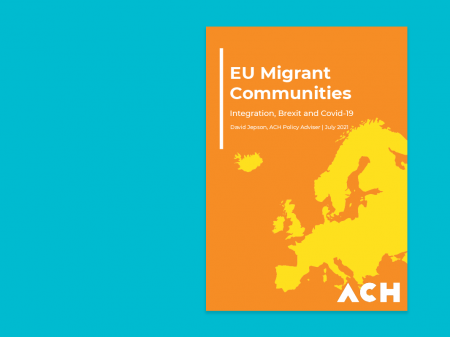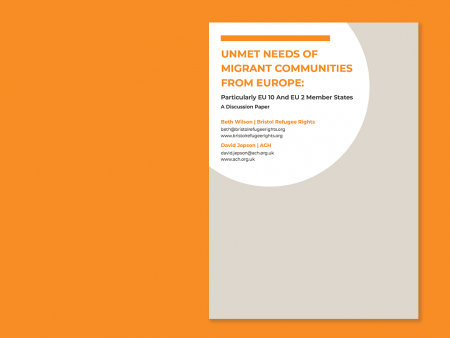
EU Migrant Communities | Meeting needs through Brexit and Covid-19
EU Migrant Communities: Meeting needs and improving visibility through Brexit and Covid-19 was a workshop organised by ACH as part of our Quartet Community Foundation funded work investigating how we can help EU migrant communities address the impact of Brexit and Covid-19.
At ACH we provide services for newly arrived communities in the UK. Whilst many of our day-to-day services are tailored for newly arrived refugee communities, we have also become concerned by EU migrant communities impacted by the simultaneous issues of Brexit and Covid-19.
Our discussion was held on zoom on the 6th July, just one week after the deadline for the EU Settlement Scheme (EUSS) for EU migrants wishing to stay in the UK. The total number of applications for EUSS up to the 30th April 2021 was 5,118,300, showing just how many people are affected. There are also many people who may have missed the deadline altogether, putting them at further risk of precarity or even destitution. The timing of this workshop meant our discussions were even more crucial and at times emotional for participants.
The meeting was opened by David Jepson, our Policy Advisor at ACH, and featured contributions from Dr Razvan Constantinescu, Romanian Consul in Bristol and Deborah Kinghorn from Bristol City Council International Team.
Throughout the workshop, we found that these three themes became apparent as being central to the issue: information and communication, employment and precarity and identity, belonging and trust.
Information and communication
Throughout both Covid-19 and Brexit, communicating key information effectively has been a major concern for local councils and organisations working with EU migrant communities.
During the workshop, we discussed the need to improve civic and community engagement through the provision of information in first language for EU migrants and the need for more community engagement to disseminate information about services. Points were raised by participants that although there may be an availability of translation services offered by local councils, these services are not always widely known about within migrant communities.
As a group, our discussion turned to the need for local organisations and councils to find ways to work more closely together on joined-up community engagement to advertise services and provide advice and assistance to communities in relation to legal status and other topics. This is so important as people are at risk of getting left behind through the Covid-19 crisis and Brexit fallout.
Employment and precarity
Through both Covid-19 and Brexit, employment and precarious employment for all communities has been affected, but EU migrants communities can be more susceptible to becoming trapped in unstable work.
Deborah Kinghorn from the Bristol City Council International Team highlighted findings from the Bristol Diaspora Discussion Group that identified key concerns post-Covid-19. For the group, supporting people into new opportunities and moving towards secure employment, skills recognition and supporting new businesses, was a key issue for communities.
During our workshop discussions, we heard from academics in the field of hospitality, who said that the hospitality industry should be seen as a viable long-term profession. Dr Razvan Constantinescu highlighted the need to address the issue of EU migrants becoming trapped in industries when they have high skill levels in other areas.
Identity, belonging and trust
One of the things highlighted throughout the workshop was the highly emotional nature of both Covid-19 and Brexit, and how much it has had an impact on the way people view their identities, and how much trust they place in government and society.
Moving forward, organisations and local governments will need to think about how to navigate these issues and start to build trust and how the contributions made by these communities can be better recognised and their voices heard.
Next steps
Taking these discussions and turning them into actions is so important. For ACH, we are taking the next steps to address these issues:
- How to improve civic and community engagement and enhance communication.
- How to ensure labour market progression with an emphasis on hospitality.
- How to connect local and regional actions to national debates around policy and legislation.

